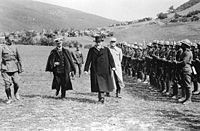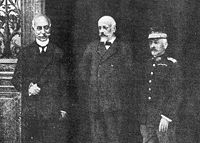- Movement of National Defence
-
The Movement of National Defence (Greek: Κίνημα της Εθνικής Αμύνης) was an uprising by Venizelist officers of the Hellenic Army in Thessaloniki in August 1916 against the royal government in Athens. It led to the establishment of a separate, Venizelist Greek government (the "Provisional Government of National Defence") in the north of the country, which entered the First World War on the side of the Allies. This was a defining moment in the development of the great National Schism in Greece, whose effects would endure until after the Second World War.
Background: Greece 1914–1916
Greece had emerged victorious from the 1912-1913 Balkan Wars, with her territory almost doubled, but found itself in a difficult international situation. The status of the Greek-occupied eastern Aegean islands was left undetermined, and the Ottoman Empire continued to claim them, leading to a naval arms race and mass expulsions of ethnic Greeks from Anatolia. In the north, Bulgaria, defeated in the Second Balkan War, harbored revanchist plans against Greece and Serbia. The two countries were bound by a treaty of alliance which promised military assistance in case of a Bulgarian attack, but in August 1914, the danger would emerge from a different quarter altogether: the Assassination of Archduke Franz Ferdinand led to the declaration of war by Austria-Hungary on Serbia and the outbreak of the First World War.Greece, like Bulgaria, initially maintained neutrality, but as the war continued, both warring camps began wooing the two countries. At this point the first rifts appeared among the Greek leadership: The very capable Prime Minister, Eleftherios Venizelos, an ardent admirer of Great Britain, supported entry in the war on the side of the Entente, while the King, who had been educated in Germany, married to the Kaiser's sister, and a deep admirer of Prussian militarism, anticipated a German victory. Aware that Greece was vulnerable to the British Fleet, he advocated a course of neutrality.
In early 1915 the British offered Greece "territorial concessions in Asia Minor" if it would participate in the upcoming Gallipoli Campaign. Venizelos supported this idea, but run into the opposition from the King and his military advisors. As a result, Venizelos submitted his resignation on 21 February 1915. The Liberal Party won the May elections, and Venizelos again formed a government. When Bulgaria mobilized against Serbia in September 1915, Venizelos ordered a Greek counter-mobilization and called upon the Anglo-French to establish themselves in Thessaloniki as to aid Serbia. Indeed, the Allies began landing on 22 September 1915 and started entrenching themselves around the city. The King unconstitutionally dismissed Venizelos and the parliament, making the breach between the two men and their followers irreparable. The Liberals boycotted the December elections. In the same month, the French, with the permission of Venizelos, occupied Corfu, where the remains of the Serbian Army were gathered before being sent to Thessaloniki. In view of these events, a clandestine "Revolutionary Committee of National Defence" was formed in Thessaloniki by a group of prominent Liberals, including Alexandros Zannas, Periklis Argyropoulos, Dimitrios Dingas, Major General Emmanouil Zymvrakakis and others. The group acknowledged Venizelos as its leader, and began approaching officers of the Army and the Cretan Gendarmerie.
During the following year, Greece's official Royalist governments were hard-pressed to maintain the country's neutrality. The final straw came when, on May 13/26 1916, the Athens-based Royal government, succumbing to German pressure, ordered the surrender of the vital Rupel Fortress to the Germans. In response, on 21 May/3 June, the pro-Entente Venizelists imposed martial law, effectively abolishing royal sovereignty in all of northern Greece. In August, the Bulgarian advance in eastern Macedonia commenced, facing little resistance, since the Athens government refused to condone any firm action. As a result, more than 6000 men of IV Corps surrendered to the Germans on 13 August (O.S.) and were deported to Görlitz in Germany. This surrender of hard-won territories with only token resistance, outraged most Greeks. At the same time, the establishment of the exiled Serbian King and his government in Thessaloniki in April, the presence of 120,000 Serbian troops in the Macedonian Front, accompanied by threats from the Entente that he would install a Serbian prefect in the city, raised fears that the city would be handed over to the Serbians.
The Revolution breaks out
On 17 August 1916 (O.S.), Venizelist officers of the Revolutionary Committee, rose up, despite Venizelos' own reservations. Although they could count on the support of many individual officers, the only major force to declare itself openly for the movement were the men of the Cretan Gendarmerie. Initial clashes between the rebels and the loyal 11th Division of Colonel Nikolaos Trikoupis left 3 dead, but French intervention soon ended the firefight. On Sarrail's orders, the officers still loyal to the government were dismissed and sent to Athens, while the troops were disarmed and interned in camps. The revolution established control of Thessaloniki and was soon reinforced by the remnants of the Serres Division, which gave some credibility to the movement.
The "State of National Defence"
 Venizelos inspects Greek troops on the Macedonian front, accompanied by Admiral Koundouriotis and General Sarrail.
Venizelos inspects Greek troops on the Macedonian front, accompanied by Admiral Koundouriotis and General Sarrail.
Venizelos himself proceeded from Crete through the Aegean islands to Thessaloniki. Upon his arrival there, the "Revolutionary Committee" handed over power to him. On September 16, Venizelos formed a "National Triumvirate" with General Panagiotis Danglis and Admiral Pavlos Koundouriotis, and proceeded to form a government. On 29 September, Maj Gen Emmanouil Zymvrakakis was appointed Army Minister (replaced on December 6 by Maj Gen Konstantinos Miliotis-Komninos) and on October 3 Nikolaos Politis was appointed Foreign Minister. On 6 October other ministries, euphemistically called "General Directorates" were established:
- Themistoklis Sophoulis, Interior Minister
- Miltiadis Negrepontis, Finance Minister
- Thalis Koutoupis, Minister of National Economy
- Dimitrios Dingas, Justice Minister
- Georgios Averof, Education Minister
- Alexandros Kassavetis, Transport Minister
- Leonidas Embeirikos, Minister for Supply and Food Distribution
- Spyridon Simos, Minister for the Refugees
- Andreas Michalakopoulos, Minister for Public Estates and Resettlement
The first tasks of the new government were the establishment of an army to fight alongside the Allies, and the consolidation of its rule in as much of Greece as possible. The Provisional Government declared war on the Central Powers on November 24 1916, and set out to recruit divisions for the Macedonian Front, something which was achieved with speed and often ruthlessness. Despite calls by some officers to abolish the monarchy and declare a Republic, Venizelos chose a more moderate path. He had declared: "we are not against the King, but against the Bulgarians". Nonetheless, the reluctant and uneasy coexistence of the two Greek states was not destined to last, as the Noemvriana riots against Venizelists in Athens clearly illustrated that a rapprochement was now impossible.
The division of the country lasted for 9 months. On June 15, 1917 a Venizelist ultimatum forced King Constantine to abdicate in favour of his second-born son, Alexander, and, with the rest of his family, leave the country for Switzerland. Venizelos returned to Athens, as head of a superficially reunified Greece, and led it to victory alongside the Allies in World War I, but also in its entanglement in the subsequent Asia Minor Campaign. As such, the immediate aims of the "National Defence" were met. But the revolution was also an expression of the wide rift between the quasi-republican, progressive Venizelists and the conservative Royalists/Anti-Venizelists, and its outbreak marks also the beginning of the Greek National Schism which would leave a troublesome legacy to the country, as it continued in various forms up to the 1970s.
Categories:- Conflicts in 1916
- 1916 in Greece
- Greece in World War I
- Military coups in Greece
- Modern history of Greek Macedonia
- Eleftherios Venizelos
Wikimedia Foundation. 2010.

